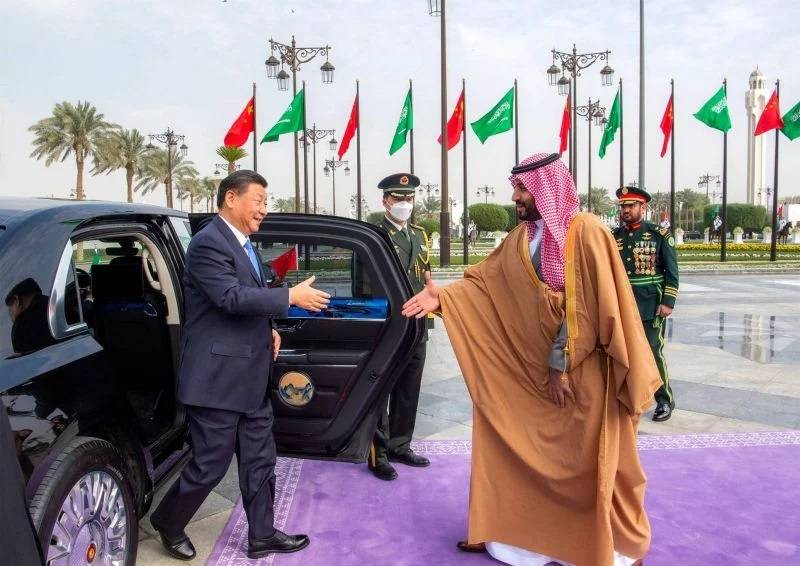
Saudi Prince Mohammad bin Salman welcomes Chinese President Xi Jinping in Riyadh on Dec. 8, 2022. (Credit: Saudi Press Agency/Handout via Reuters)
BEIRUT — The Gulf Cooperation Council (GCC) called on the Lebanese authorities Friday to "respect the Constitution and its deadlines," while the country is plunged into an unprecedented economic crisis coupled with a political crisis.
No president has yet been elected in Lebanon since the departure of Michel Aoun on Oct. 31, while the government is resigned and responsible only for expediting current affairs.
The GCC met in Riyadh in the presence of Chinese President Xi Jinping, who is concluding a three-day visit.
Support for the Lebanese Army
In a statement relayed by the National News Agency, the GCC recalled "its constant position alongside the Lebanese people" and its support "for the sovereignty of Lebanon, its security and stability, and the Lebanese Armed Forces that protect its borders and face the threats of extremist and terrorist organizations," in a clear reference to Hezbollah.
The statement also called on all Lebanese parties "to respect the Constitution and its deadlines, and to do all the work necessary to achieve the people's aspirations for stability, progress and prosperity."
The GCC urged the Lebanese authorities to carry out "complete reforms," to control the whole territory and "to respect the decisions of the UN Security Council, as well as the Taif Agreement," which had put an end to the Lebanese civil war in 1989.
The GCC condemned, as usual, "Iran's continued support for terrorist organizations and sectarian militias in Iraq, Lebanon, Syria, Yemen and elsewhere, which threaten Arab national security, destabilize the region and hamper the work of the international coalition in the fight against [the Islamic State group]."
Lebanon has been in the midst of a socio-economic collapse for the past three years, a crisis marked by a sharp depreciation of the national currency that has pushed nearly 80 percent of the population below the poverty line, according to UN figures.
Added to this situation is a political crisis, exacerbated at the end of October when former President Michel Aoun's term in office ended without a successor having been elected. Meanwhile, the government is serving in a caretaker capacity, having resigned following parliamentary elections in May.
Drug trafficking
Earlier on Friday, in a joint statement closing their summit in Riyadh, China and Saudi Arabia called Lebanese stakeholders to dialogue to overcome the crisis and urged against Lebanon "becoming a platform for terrorist actions and a base for terrorist organizations and groups that would disrupt the region's security and stability, as well as a source or transit point for drug trafficking."
The Wahhabi kingdom regularly issues such warnings about Lebanon in condemnation of Hezbollah, the only Lebanese party still armed and a supporter of Iran, Saudi Arabia's sworn enemy.
Chinese President Xi Jinping concluded his three-day visit to Saudi Arabia on Friday with a summit with the region's leaders. The region has been wrought by energy issues, against a backdrop of rivalries between Washington and Beijing in the battle for influence in the Middle East.
Mikati's meetings
During this summit with Xi Jinping, outgoing Lebanese Prime Minister Nagib Mikati gave a speech assuring that "Lebanon hopes a lot from this summit and will work to revitalize cooperation with its Arab brothers, as well as with China."
"The Arab world, which has many human and natural resources, is in the midst of international attention, especially China, to which many commonalities connect us," Mikati added.
The Prime Minister also held a series of meetings with Arab leaders, his press office said. On Friday morning, he met with Iraqi Prime Minister Mohammad Chia al-Soudani, and "it was agreed to hold a meeting of the Lebanese-Iraqi High Joint Committee in Beirut soon, on the occasion of Mr. Soudani's next visit."
According to the press office, Soudani also assured Mikati of "continued cooperation to supply Lebanon with Iraqi oil, in accordance with the agreements reached."
Under an agreement inked in July 2021 with Iraq, which now represents Lebanon's state power provider’s only source of fuel, the country has been receiving fuel required for Electricité du Liban to run its power plants with the latest shipment taking place in October — a 30,000-ton gas oil shipment.
This deliveries are vital for Lebanon, which has been hit by one of the worst economic crises the world has seen in more than 150 years, according to the World Bank, and while EDL is barely able to provide one hour of power supply per day, given its inability to purchase fuel to run its power stations.
Meanwhile, Lebanon's premier also held a meeting with his Algerian counterpart, Ayman Abdel Rahman, during which they followed up on discussions they had during the Algiers Summit last October. Mikati did not give further details on the discussions.
Kuwait's Crown Prince Sheikh Mishaal Al-Ahmad Al-Jaber Al-Sabah also received Mikati this morning along with the Lebanese delegation. During the meeting, they discussed the countries' relations. Mikati said that he indicated that he would "visit Kuwait at the head of his cabinet delegation at the beginning of the new year to discuss multiple dossiers."